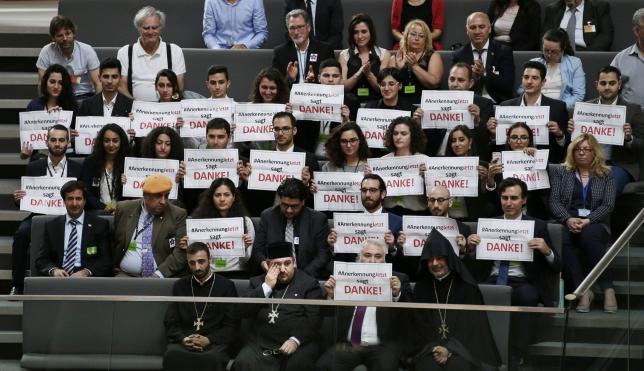Armenian genocide: what victims’ descendants demand from Turkey 106 years later
April 24 is the official Day of Remembrance of the Victims of the Armenian Genocide.
More than 2.5 million Armenians lived in the Ottoman Empire in 1915 on the eve of the genocide.
As a result of the killings and mass deportation, more than half of them died. Hundreds of thousands moved to other countries by land and sea. It was after these events that large Armenian diasporas were formed in different parts of the world.
Armenia, several Western countries and international organizations officially recognize those events as genocide. Turkey categorically does not.
Below: how the story continues to resonate 106 years later, how the topic of genocide ceased to be banned in Soviet Armenia, how relations with Turkey have developed in recent years and why recognition of the fact of genocide is necessary.
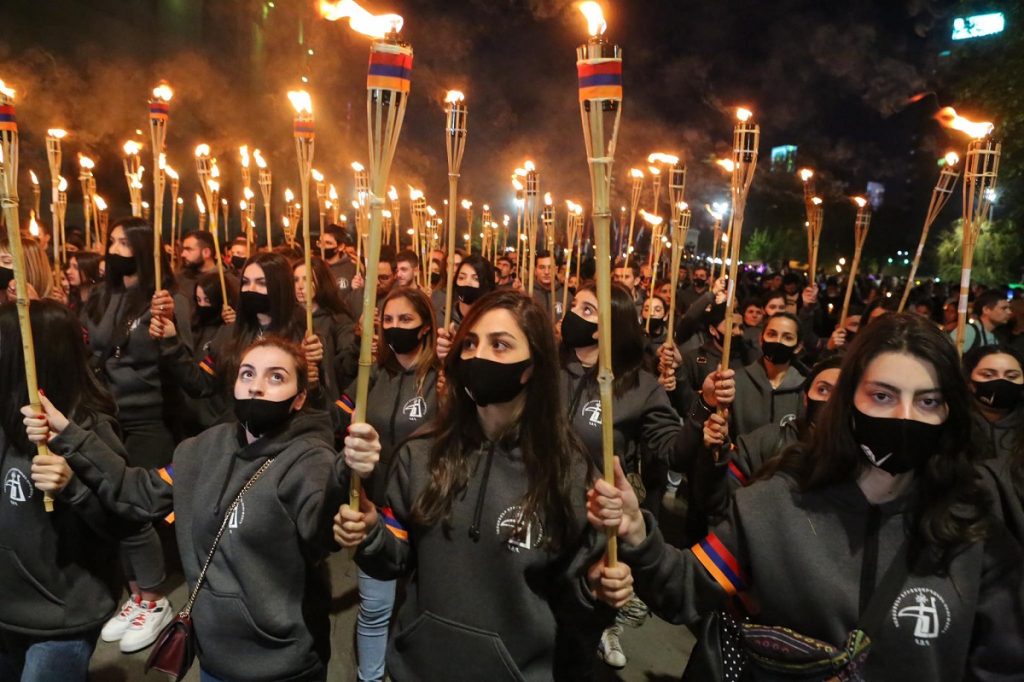
Remembering the Genocide in the Soviet Union
Any mention of the Armenian genocide in the Soviet Union was impossible and fraught with the potential for criminal prosecution. The situation changed in 1965. The first secretary of the Central Committee of the Communist Party of Armenia, Yakov Zarobyan, was able to get the consent of the highest Soviet elite to mark the 50th anniversary of the tragic events in Armenia.
Many believe that this became possible once the Soviet regime softened after the death of Stalin and the so-called ‘Khrushchev thaw’ began.
But agreement was given on the condition that in the process of carrying out commemorative activities, territorial issues not be raised. This pertains to lands where the Armenians originally lived before being expelled from Turkey. People somehow became aware of Moscow’s demand. In Yerevan, leaflets were circulated calling for the public to take part in a protest rally on Lenin Square on April 24.
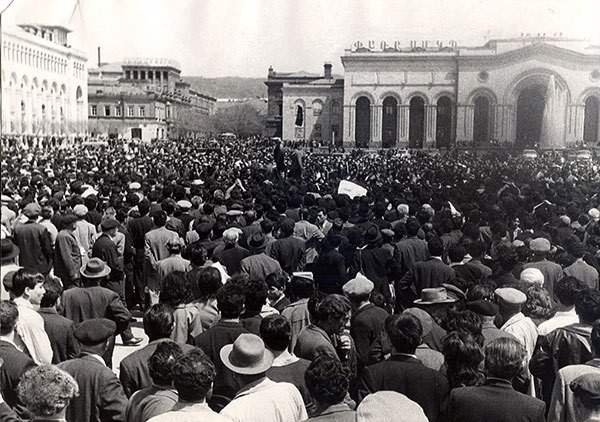
According to eyewitnesses, tens of thousands of people gathered at the rally. The police’s attempt to disperse it did not produce results – a crowd of thousands sat on the asphalt, ignoring the demand to go home.
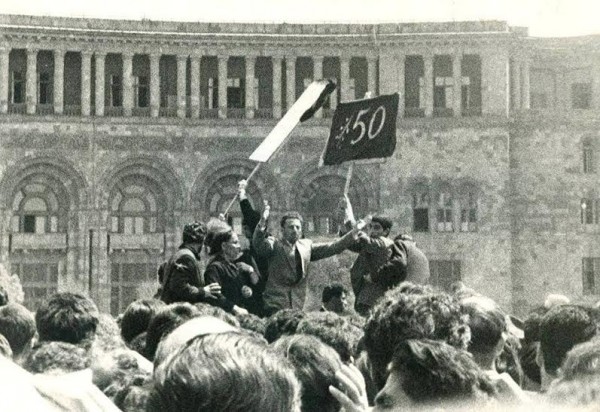
A few months later, Yakov Zarobyan was removed from office. Perhaps due to the fact that initially he took full responsibility for the commemorative events without any excesses.
But two years later, a memorial to the victims of the genocide was opened in Yerevan on Tsitsernakaberd Hill.
It is here where people bring flowers and candles on April 24th, at which time thousands of diaspora Armenians from around the world come to Armenia.
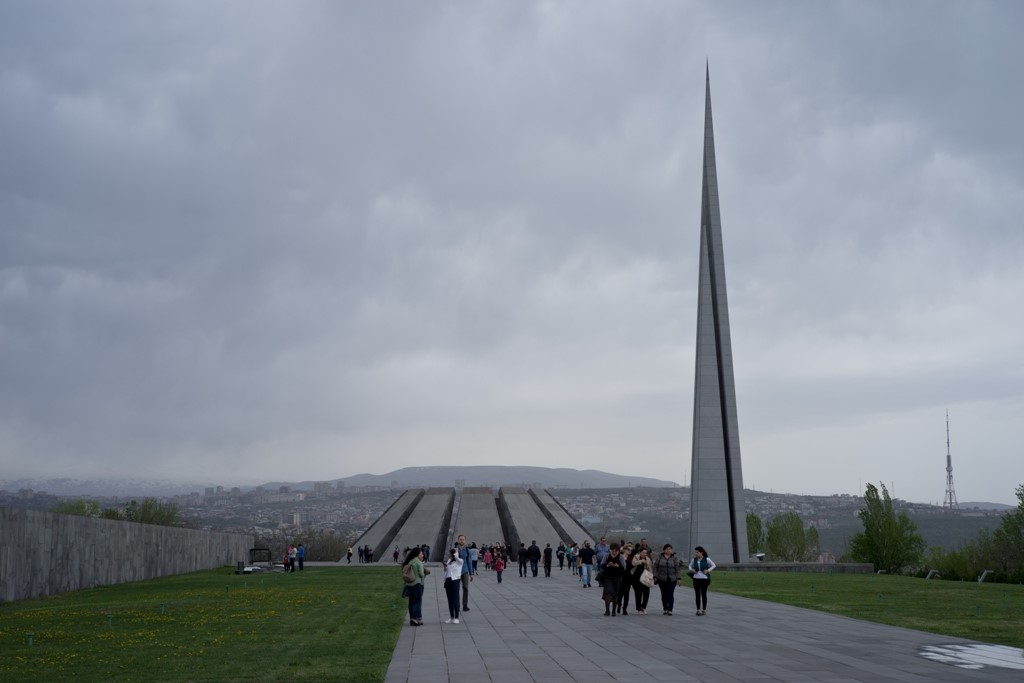
Next step – “remember and demand”
“Memory, even historical, is changing. In the first 50 years after the genocide, the memory of losses prevailed. The loss of the homeland, countless lives, cultural heritage, etc. At the same time, there was always an understanding that we opposed and survived. In Soviet times, we were instilled with the idea that the Soviet government and the Russian fraternal people supposedly saved us from complete extermination. The memory began to normalize in 1968,” said Harutyun Marutyan, director of the Museum and Institute of the Armenian Genocide.
At the end of the twentieth century, he says, the Armenian people managed to overcome the so-called “victim complex”.
Already in 2015, commemorative events for the 100th anniversary of the tragic events were held not in the spirit of national grief, but with the new slogan “I remember and demand.”
The authorities and Armenian society for the first time massively started talking about new demands.
What are these requirements and to whom are they directed? The successor to the Ottoman Empire is Turkey, and therefore all the requirements relate to this state, says historian, Armenian Ambassador to Canada in 2000-2006, Ara Papyan:
“What do we demand? There is no single answer to this question. Yes, we demand recognition and condemnation of genocide. However, I do not think that we should be limited only to this. Even before the 60s of the last century, people, if they didn’t publicly talk about territorial claims, felt this in themselves.”
Ara Papyan’s opinion is not very popular in the country, but he is confident that independent Armenia should set the goal of restoring rights to certain territories. And this process should be based on international law.
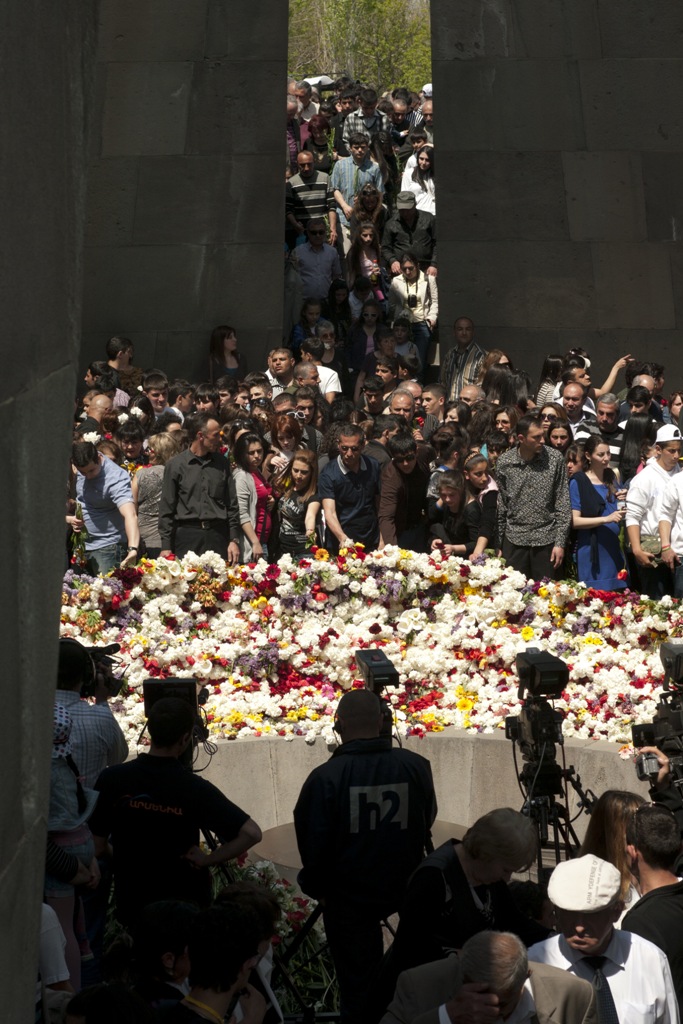
Not the best relationship
“On December 24, 1991, Turkey officially recognized the Republic of Armenia, but still refuses to establish diplomatic relations. In 1993, Turkey unilaterally closed its air and ground borders with Armenia. The air border was opened in 1995 under pressure from the international community. In order to open a land border and establish diplomatic relations, Turkey sets forth a number of unacceptable conditions,” Armenian Ministry of Foreign Affairs describes relations between the two countries on its website.
One of the “unacceptable conditions” is the refusal of international recognition of the Armenian Genocide.
In 2008, an attempt was made to normalize relations with the use of ‘football diplomacy.’ Armenian President Serzh Sargsyan invited his Turkish counterpart Abdullah Gul to Armenia to a football match between the national teams of the two countries. Based on the results of several meetings at various levels, protocols were developed that suggested establishing relations without preconditions.
On October 10, 2009, the foreign ministers of the two countries in Zurich signed the protocols “On Establishment of Diplomatic Relations” and “On the Development of Relations between the Republic of Armenia and the Republic of Turkey”. But after their signing, Turkey refused the agreements reached and stipulated the ratification of documents in parliament by the settlement of the Nagorno-Karabakh problem.
In 2010, the Turkish president signed a decree to suspend the ratification of the protocols. In 2015, the protocols were withdrawn from the parliament of Armenia, and in 2018, President Serzh Sargsyan signed a decree to terminate the procedure for concluding the protocols.
Is reconciliation possible?
The initiative to establish relations in 2008 without any preconditions was severely criticized in Armenia. And not only in political circles, but also in society as a whole. Many in Armenia believe that dialogue with Turkey is possible only after the recognition of the genocide by official Ankara.
The Director of the Museum and Institute of the Armenian Genocide agrees with this:
“Reconciliation involves recognition, condemnation and redress. Reconciliation is impossible between separate groups that see each other for several hours, between politicians. It should take place between two nations. I don’t see any elements of this process today.”
Why doesn’t Turkey recognize the Armenian genocide, as Germany has the Holocaust?
According to Ara Papyan, the main reason is possible territorial claims:
“In the case of the Armenian genocide, people were exterminated and expelled from their ancestral lands. And, of course, there is fear that recognition may be followed by material compensation, which could reach billions of dollars.”
Armenian authorities have never publicly expressed territorial claims against Turkey. However, the topic of lost lands remains an issue.
“We have substantial legal grounds for territorial claims. The political situation is changing rapidly. And if we are ready and will carry out consistent work in this direction, we will be able to take advantage of the situation, ” Ara Papyan thinks.
What will international recognition result in?
While Turkey continues its denial policy, other states and international organizations are adopting resolutions recognizing the massacre in the Ottoman Empire as genocide.
Yerevan states that Armenia continue to seek international recognition. Armenian diaspora organizations do not give up their goal.
“In this context, I advise our officials to never say that Armenia has no territorial claims against Turkey,” says Ara Papyan.
International recognition of the Armenian Genocide is only the beginning of a big process, adds Harutyun Marutyan, director of the museum-institute:
“Recognition will give Armenia international guarantees of security. This will provide an opportunity for greater freedom of action in foreign policy. Finally, this will create a serious basis in order to translate the issue of certain requirements and claims in the legal plane ”.
